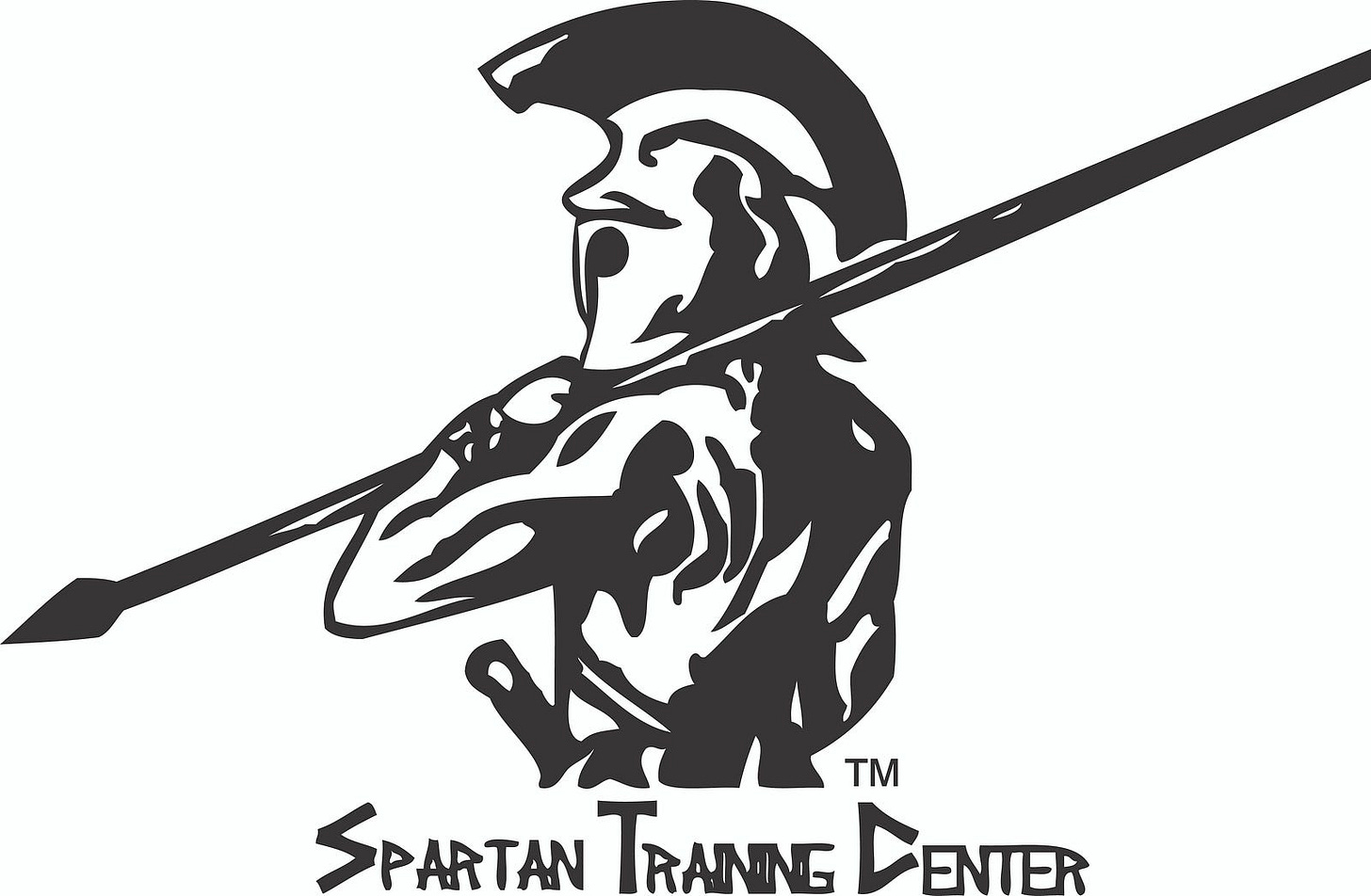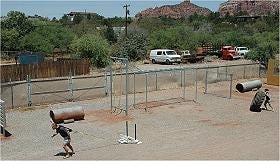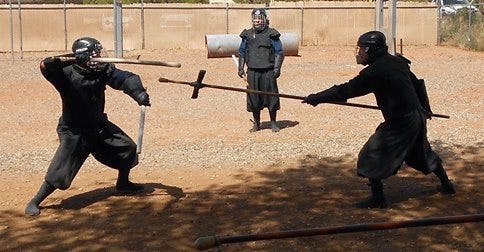What I learned at the Spartan Training Center
We are all innately attracted and repulsed by VIOLENCE AND CONFLICT.
This is obvious looking in popular culture. The media consistently riddles us with a horrible litany of violence and conflict that seems to come from all directions. The hotly contested debate over gun control. The mass appeal of violent movies and television. The popularity and controversy over MMA. Even some of my most liberal and peaceful friends love to watch Jason Bourne skillfully kill dudes. Matt Damon opposes guns while he makes millions of dollars portraying Jason Bourne.
Humans are compelled by violence and conflict just as we are compelled by food and sex.
Let me be clear. This is not a value judgment about whether violence and conflict are good or bad, nor whether one day humanity can live without them. I believe humankind is evolving toward more compassion and wisdom. I believe we should all pray for peace. But this is a long-haul on an evolutionary scale. I am simply stating the way things are.
Violence and conflict are everywhere to varying types and degrees. There is widespread international and civil war on one end of the spectrum. We have arguments with spouses and subtle conflicts with co-workers on the other end.
The possibility of basic physical violence is greater than many people believe. Over a 30-year span, the average American has roughly a 1 in 9 chance of becoming a victim of robbery, assault, rape or murder.
Every man and woman who has ever walked this earth has faced numerous threats. Each one of us, ultimately, loses the battle to survive. The fundamental threat to life is part of the very fabric of the human experience. We innately and viscerally understands this. Every one of us must face this fundamental fear one day.
There is great wisdom in deeply accepting death. But it is also our responsibility to be vigilant, aware, critically-minded, and to draw clear distinctions. It is our responsibility to survive, not merely for the sake of survival, but for all the ways we can make life better, more meaningful, more beautiful, and more full of love. It is our responsibility to protect what is good. Some follow this calling.
To be a protector, you do not need to be on constant, irrational high alert. But it is necessary to face the world clearly, critically, and honestly. You must address the complexity of conflict and violence as it exists in the real world.
This is an enormously complicated and open-ended pursuit. Threats include environments, machines, animals, microorganisms, one’s own mind, lifestyle choices, activities, and other people. People, acting as an individual or as a group, pose a diversity of threats. Groups vary greatly in degrees of organization, complexity, technology and weaponry.
There are equally, perhaps more, dangerous and destructive threats to intellectual, spiritual, and cultural well-being. These include bad ideas and ways of thinking, bias, dogmatism, close-mindedness in its many forms, and superstition.
Which is the greatest threat? The more important question is, “Who will face the threat?” It does not suffice to push responsibility off on others. I invite you to join a small but growing faction who live as protectors and leaders, and who are committed to utter responsibility and to becoming better every day.
The professional fighting man has the advantage of knowing his incompetence can mean death for his men or himself. Death is imminent in ways most people don’t experience. Death itself is motivation to excel. Of course, this is not always the case, but this is one reason many great men in history were armed professionals.
History has proven the wisdom and value that come from the fires of war. Battle brings forth the very worst and the very best of humanity. And the value reaches beyond the armed professions.
It is trite in business leadership, sales and marketing to apply combat tactics and strategy, or to gain insight from studying Sun Tzu, Miyamoto Musashi, or Carl Von Clausewitz.
Narratives are determinative. We are forced to choose our own narratives, or we accept them blindly. Therefore, I choose the warrior path.
However, you do not need to be an armed professional to emulate the warrior ideal. And not all armed professionals are warriors. This is by no means only a path for people who carry weapons for work.
Take me as an example. I have never been an armed professional. And it is improbable I will ever face a serious violent encounter. I hesitate when someone asks me what I “do,” even though I understand the question is about my job. I consider a range of responses. “I’m a salesman.” “I’m an entrepreneur.” “I’m a man of action.” “I’m a martial artist.” “I’m a seeker and a visionary.” “I’m a reformed douche-bag, NYC tax attorney and now a wannabe writer.” Sometimes I identify with my hobbies or with activities I enjoy. “I’m a snowboarder and extreme sports enthusiast,” or “I’m an amateur beer connoisseur.” “I’m a gardener, a budding hunter, and foodie.” Often I identify myself as a husband, a father, a brother, a son.
In the past I often wrestled with the “why?” Why does the warrior ideal attract me? Why do I spend so much time training combative skills? For what? To start answering those questions, let me quote an Exemplar, Col. George H. Bristol, USMC, Ret.:
“Committed to EXEMPLAR: mind, body, bone, blood, and the heart that pumps it. Pursue excellence in all things. Seek becoming rather than being.”
These words are from one of the greatest, most experienced, fighting men alive, but the value of these words go far beyond the professional fighting man. So then what does this have to do with me? What does this have to do with you? Well, maybe everything.
Ultimately, mastery of the weapon comes from mastery of one’s own mind. In his famous “Book of Five Rings,” Musashi Miyamoto proclaimed one must master himself to master others. The Zen priest, Takuan Soho, in his letters to the swordsman, Yagyu Munenori, called it “No-Mind” or “Right Mind.” Takuan described focused, present state awareness not allowing the mind to get stuck on anything. In “The Life Giving Sword,” Yagyu Munenori wrote,
“[Y]ou will not be self-conscious and your mind will not be occupied with what you are doing. Thus, in ten out of ten times, your body, hands, and feet will make no mistakes. But if your mind slips in even slightly, you will miss your aim. When you have No-Mind, you will hit the mark every time.”
When one achieves this mastery of mind, it necessarily permeates into every action, every step, into the blood, bones and spirit. One can stand at the threshold of death, calmly hold his ground, and respond appropriately. There is no greater power in life. Excellence is forged at the precipice between life and death.
In a world of safe spaces, we’re weakening, and we’re starving for struggle, for rights of passage. I, for one, have been through too much schooling. But the best education about how to live my life has come from the Spartan Training Center. Hunter B. Armstrong founded and operates the Spartan Training Center with emphasis “on physical conditioning and close-combat skills training that reflect the definition of what is Spartan.”
Nestled off the main road in Sedona, AZ, the Spartan Training Center is a 5,000 sq. ft. indoor/outdoor training facility consisting of a 1,000 sq. ft., rectangular, industrial building and an outside open training area with some truck tires and simple obstacles to negotiate. Inside the building are a small office, two small bathrooms, a small storage closet, and an open room with sundry weapons and strength equipment used for training natural movement. The Spartan Training Center is an university of Exemplars where they meet, train, and exchange ideas.
I grew up in the suburbs about 50 miles north of NYC. In 2008, I moved to Sedona, AZ to study with Mr. Armstrong. In keeping with our tradition, I have never paid a dime in return for instruction. Money is never the point.
I have always been enamored of martial arts. It’s in my DNA. Since I was six years old, I’ve studied various fighting systems to varying degrees of seriousness. Mr. Armstrong is one of a few living with the complete battlefield syllabus in Shinkage Ryu and Owari Kan Ryu, unbroken from 15th and 16th Century Japan. In other words, Mr. Armstrong carries the same ancient lineage handed down from Yagyu Munenori quoted above.
I am not claiming any level of expertise. I don’t have any special ninja skills. I don’t recommend you follow the Warrior Path because of what I have to say about it. For my part, I’ve simply been fortunate enough to have been taught by Exemplars.
The lessons and insights have informed every aspect of my life. I will never forget something Mr. Armstrong said to me:
“When you focus on your enemy’s spear point, your mind gets stuck on what is going to kill you, and you are not able to move. You lose your ability to assess, and you will die on your enemy’s weapon.
But if you can train your mind and body to focus on your target no matter what dangers or hardships you face, then your enemy’s weapon becomes nothing but an obstacle on the way to your target.
Focus your mind on your target, and let your mind be fluid and able to assess and change, and you will clear any obstacle on the correct path to your target. That is the only way to succeed and dominate in the chaos of combat.
All of life is like the spear.”
These are ancient principles of Japanese battlefield weaponry and strategy. They apply literally to weapon-use and close-combat generally. Mr. Armstrong was pointing out the metaphor as it applied to hardship I was going through at the time.
These are not mere concepts to Mr. Armstrong. He embodies these principles literally in the use of weapons. He also embodies them in his approach to life. I witnessed him beat stage-3 cancer. I have never seen such unflinching courage and determination. He placed his mind on moving forward on the path and nothing else. He did not deny his situation. He faced it squarely. Not once did I see him complain or show any fear. Despite months of excruciating pain and discomfort, Mr. Armstrong composed himself like a man would hope he could in his finest hours. If he could stand, he was training. His mind never wavered.
Throughout his treatments, he trained. I was continually baffled by his dominance. He lost 30 pounds. I never eased up because he hurt me whenever I did. Somehow, even as I was improving, he became that much more dangerous with a weapon. I’m not exaggerating slightly. This illustrated in shining example how the mind, correctly trained, is the powerful driving force behind action.
Of all the lessons I’ve learned from Mr. Armstrong, watching him through this time was the most profound. He embodies the warrior ideal. Still, never satisfied to remain where he is, he is always, in every moment, endeavoring to become more.
The warrior ideal goes beyond the intrinsic appeal of combative capability. At its heart is a commitment to protect and lead, and the pursuit of excellence with an urgency motivated by death. It is the resolve to do whatever is necessary when it is necessary.
Whatever your profession, whatever you do in life, whatever you value. Imagine if you were to “pursue excellence in all things” with an urgency motivated by death itself. What would your life look like?
Tragically, most people are not motivated to mastery. Too often we drift through life pretending death isn’t coming. Too often we take our lives for granted. But make no mistake, your life depends on it. Death stares you in the face every moment whether or not you have the courage to stare back. For some people death is a greater immediate risk. But death is the only event you can be absolutely certain will happen. Think about it: you are going to die. And your death is coming in the blink of an eye.
So what are you going to do with your life? Will you face your fear? How will you spend your precious time? You can play video games and fantasy football. You can remain squarely within the spectator culture watching from the outside. Maybe you should.
Well, I propose an alternative. Pursue excellence in all things. I propose that you walk the warrior path. Define it, and be it.
For me, this has value as a husband, as a father, as a friend, as an entrepreneur, as a salesman, as a seeker, as a leader, and as a protector.
My claim is simple: The more you embody the warrior ideal, the better your life, the more effective you are, the better you will make the world around you. And, most importantly, these are traits humanity needs desperately from you.
Humankind is at a precipice. Civilization may go in one of two divergent directions: great progress or great decline. No one can predict which. However, you can do your part. I propose you focus on personal responsibility rather than waiting for help. The next president cannot help you. Only YOU can. Start inside and work out. Make yourself better. Make your family better. Make your community better.
And when Hell comes to your gate, FIGHT with honor and courage.
If you are still reading this, I guess you see the value as well. We are cut from the same cloth. I am by no means claiming to be a warrior. I don’t want your applause, and I don’t want your money. I simply ask you to be your best, and become better every moment.
The prescription is simple: train everyday. Become more every day.
If you can hear the calling even faintly, I urge you to take the path. I ask you to challenge me to do the same. Become utterly and completely responsible for your life and sphere of influence. Define what is good and fight for it like your life depends on it.






